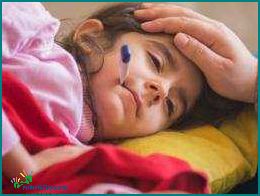Contents
Causes, Symptoms, and Treatment Options for Fever in Teenagers: A Comprehensive Guide

When teenagers fall sick, it can be a worrisome time for both them and their parents. One common symptom that often accompanies illnesses in teens is a fever. A fever is a temporary increase in body temperature, usually caused by an infection or illness. It is the body’s natural response to fight off viruses and bacteria.
Teens with a fever may experience various symptoms, such as chills, sweating, and headache. The severity of these symptoms can vary depending on the underlying cause of the fever. In some cases, a fever may be accompanied by other symptoms like cough, sore throat, or body aches.
There are several possible causes of fever in teens. One common cause is a viral infection, such as the flu or a cold. These infections are highly contagious and can spread easily among teenagers, especially in close quarters like schools or dormitories. Other causes of fever in teens may include bacterial infections, such as strep throat or urinary tract infections.
Treatment options for fever in teens depend on the underlying cause and severity of the symptoms. In many cases, rest and plenty of fluids are recommended to help the body fight off the infection. Over-the-counter medications like acetaminophen or ibuprofen can also be used to reduce fever and alleviate symptoms. However, it is important to consult a healthcare professional before giving any medication to a teenager.
In conclusion, fever in teens can be a common occurrence when they are sick. It is important for parents to monitor their teenager’s temperature and symptoms closely. If the fever persists or is accompanied by severe symptoms, it is advisable to seek medical attention. With proper care and treatment, most teens can recover from a fever and return to their normal activities in a short period of time.
Causes of Fever in Teens

Teens can experience fever for a variety of reasons. One common cause is when they are sick with a viral or bacterial infection. These infections can lead to symptoms such as headache, chills, and an elevated body temperature.
Viruses are a common cause of fever in teens. They can be spread through close contact with an infected person or by touching surfaces contaminated with the virus. Common viral infections that can cause fever in teens include the flu, common cold, and mononucleosis.
Bacterial infections can also cause fever in teens. These infections can occur in various parts of the body, such as the throat, ears, or urinary tract. Bacterial infections may require antibiotics for treatment.
In some cases, fever in teens can be a symptom of a more serious underlying condition, such as an autoimmune disorder or cancer. It is important for teens with persistent or recurrent fever to seek medical attention to determine the cause and appropriate treatment.
Overall, fever in teens is a common symptom of illness, often caused by viral or bacterial infections. Monitoring temperature and seeking medical advice when necessary can help ensure proper treatment and recovery.
Infections

Infections are a common cause of fever in teens. A virus or bacteria can enter the body and make a person sick, leading to a fever. Some common symptoms of an infection include chills, headache, and body aches. It’s important to seek medical attention if a fever persists or if there are other concerning symptoms.
Teens are particularly susceptible to infections due to their active lifestyles and close contact with others. Infections can be spread through respiratory droplets, contaminated surfaces, or direct contact with an infected person. It’s important for teens to practice good hygiene, such as washing their hands regularly and avoiding close contact with sick individuals.
If a teen is experiencing symptoms of an infection, it’s important for them to rest and stay hydrated. Over-the-counter medications can help alleviate symptoms such as fever and headache. However, it’s important to consult a healthcare professional for a proper diagnosis and treatment plan.
In some cases, an infection may require prescription medication, such as antibiotics, to fully recover. It’s important to follow the prescribed treatment plan and finish the full course of medication, even if symptoms improve. This helps ensure that the infection is fully eradicated and reduces the risk of complications.
Overall, infections can cause fever in teens and can be accompanied by various symptoms. It’s important for teens to take proper precautions to prevent the spread of infections and to seek medical attention if symptoms persist or worsen.
Inflammatory Conditions

Inflammatory conditions can also cause fever in teenagers. Inflammation is the body’s response to an infection or injury, and it can lead to a variety of symptoms including fever. When the body detects a virus or bacteria, it releases chemicals that cause inflammation, which can result in fever.
Some common inflammatory conditions that can cause fever in teenagers include sinusitis, tonsillitis, and bronchitis. These conditions often present with symptoms such as chills, headache, and a high temperature. Inflammatory conditions can be caused by a viral or bacterial infection, and treatment options will depend on the underlying cause.
If a teenager is experiencing symptoms of fever, it is important to seek medical attention to determine the underlying cause. A healthcare professional will be able to diagnose the specific inflammatory condition and recommend appropriate treatment options. This may include antibiotics for bacterial infections or antiviral medications for viral infections.
In addition to medication, rest and plenty of fluids are often recommended to help manage symptoms and support the body’s healing process. Over-the-counter pain relievers may also be used to reduce fever and alleviate any accompanying discomfort.
It is important to note that fever is a symptom of an underlying condition and should not be ignored. If a teenager is feeling sick and experiencing a high temperature, it is important to seek medical attention to determine the cause and receive appropriate treatment.
Medications or Vaccinations
When teenagers have a fever, it is important to consider the underlying cause. In some cases, medications or vaccinations may be recommended to help treat or prevent the fever.
If the fever is caused by a viral infection, over-the-counter medications such as acetaminophen or ibuprofen can be used to help reduce the fever and alleviate symptoms. These medications can also help relieve other symptoms commonly associated with fevers, such as headaches and body aches.
In some cases, vaccinations can help prevent certain infections that can cause fevers. Vaccinations are especially important for teenagers, as they can help protect against diseases such as influenza, meningitis, and pneumonia. It is important for teens to stay up to date on their vaccinations to help prevent these infections and the associated fevers.
If a teenager is sick with a fever and it is suspected to be caused by a bacterial infection, antibiotics may be prescribed. Antibiotics are only effective against bacterial infections and are not effective against viral infections. It is important to follow the prescribed dosage and complete the full course of antibiotics to ensure the infection is properly treated.
It is important to consult with a healthcare professional before taking any medications or receiving vaccinations, as they can provide guidance on the appropriate course of treatment based on the underlying cause of the fever.
Symptoms of Fever in Teens

When teens have a fever, it is often a sign that their body is fighting off an infection or virus. Fevers can make teens feel sick and uncomfortable, and it is important for parents and caregivers to recognize the symptoms so they can provide appropriate care.
Common symptoms of fever in teens include:
- Elevated body temperature: A fever is defined as a body temperature higher than 100.4 degrees Fahrenheit (38 degrees Celsius).
- Chills: Teens with a fever may experience chills or shivering as their body tries to raise its temperature.
- Headache: Many teens with a fever complain of a headache, which can be a result of the body’s immune response.
- Body aches: Fever can cause general body aches and muscle soreness.
- Fatigue: Teens may feel tired and have low energy levels when they have a fever.
- Loss of appetite: Fever can suppress the appetite, leading to a decreased desire to eat.
- Sweating: Some teens may experience sweating as their body tries to cool down.
- Irritability: Fever can make teens irritable and moody.
If a teen is experiencing these symptoms, it is important to monitor their temperature and seek medical attention if necessary. Treatment options for fever in teens may include over-the-counter medications to reduce fever and discomfort, rest, and plenty of fluids to stay hydrated.
FAQ about topic Fever Teens Causes Symptoms and Treatment Options
What is considered a fever in teens?
A fever in teens is generally considered to be a body temperature of 100.4 degrees Fahrenheit (38 degrees Celsius) or higher.
What are the common causes of fever in teens?
The common causes of fever in teens include viral or bacterial infections, such as the flu or strep throat, as well as certain autoimmune diseases and reactions to medications.
What are the symptoms of fever in teens?
The symptoms of fever in teens can vary, but often include a high body temperature, chills, sweating, headache, muscle aches, fatigue, and loss of appetite.
How can fever in teens be treated?
Fever in teens can be treated by resting, staying hydrated, and taking over-the-counter fever reducers such as acetaminophen or ibuprofen. It is also important to address the underlying cause of the fever, such as treating an infection with antibiotics.
When should I seek medical attention for a fever in my teen?
You should seek medical attention for a fever in your teen if it is accompanied by severe symptoms such as difficulty breathing, chest pain, confusion, or a stiff neck. Additionally, if the fever persists for more than a few days or is not responding to over-the-counter treatments, it is recommended to consult a healthcare professional.
What is a fever?
A fever is a temporary increase in body temperature, often due to an illness or infection.
I’m Diana Ricciardi, the author behind Makeitflip.com. My blog is a dedicated space for mothers and their kids, where I share valuable insights, tips, and information to make parenting a bit easier and more enjoyable.
From finding the best booster seat high chair for your child, understanding the connection between sciatica and hip pain, to exploring the benefits of pooping in relieving acid reflux, I cover a range of topics that are essential for every parent.
My goal is to provide you with practical advice and solutions that you can easily incorporate into your daily life, ensuring that you and your child have the best possible experience during these precious years.
